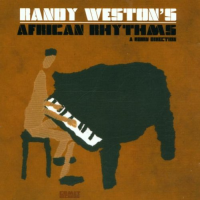Home » Jazz Articles » Album Review » Randy Weston: African Rhythms
Randy Weston: African Rhythms
In the early '60s, Weston visited Nigeria. By the end of the decade, after a 14-country African tour, he spent several years in Morocco. These experiences forever changed his music. The recent reissue African Rhythms brilliantly documents how Weston managed to incorporate the traditional rhythms and idioms of West and North Africa into his jazz playing. The music on this disc was originally released on two 1969 Comet records, African Cookbook and Niles Little Big, both credited to Randy Weston's African Rhythms.
Recorded in Paris, the quintet incorporated players from France, Nigeria, and America—plus Weston's son Niles, after whom the standard "Little Niles" was named. (That particular tune appears here, on fire all the way.) The group represents the African diaspora directly with two conga players, and indirectly through a variety of rhythmic and thematic figures drawing from Caribbean as well as North and West African sources. By this point, Weston had come to fully appreciate the virtues of non-linear playing. His melodies, still based on chord changes, have an irregular phrasing and punctuation that distinguish them from his peers. They are distinctly unpolished. The fresh, bouncing energy of his improvisations integrates musical worlds in a way that seems inherently logical. (To amplify this point, Weston once said of his early mentor Monk, "He played like they must have played in Egypt 5000 years ago." Obviously that's a high compliment. Even Sun Ra might agree on that point.)
The original tune "Afro Black" stands as a high point on the record, bubbling over with funky energy, yet still dense enough to bear serious weight. The rhythms generated by drummer Art Taylor and conga players Niles Weston and Reebop Kwabu Baah serve as pure propulsion, regularly spilling over into the realm of conversation with the pianist. Weston's "Jajouka" pays obvious tribute to the relatively square North African style of drumming, sparsely overlaid with repeated brief themes that evolve over time.
The bottom line, whether or not you're interested in the multi-cultural aspects of Weston's music, is that African Rhythms is solid from start to finish. The pianist has a talent for drawing out the best in his bandmates, and his approach to these tunes—whether blues, standards, or originals—has a gentle, coaxing quality. Most importantly, the music is completely unassuming and unpretentious.
Track Listing
African Cookbook; A Night In Medina; Jajouka; Marrakech Blues; Con Alma; Afro-Black; Little Niles; Niger Mambo; C.W. Blues; Pam's Waltz; Hi-Fly; Penny Packer Blues; Waltz for Sweet Cakes; Out Of The Past.
Personnel
Randy Weston
pianoRandy Weston: piano, grunts; Niles Weston: conga; Art Taylor: drums; Reebop Kwabu Baah: conga, chants, and cowbells; Henri Texier: bass.
Album information
Title: African Rhythms | Year Released: 2003 | Record Label: Comet Records
Tags
PREVIOUS / NEXT
Support All About Jazz
 All About Jazz has been a pillar of jazz since 1995, championing it as an art form and, more importantly, supporting the musicians who make it. Our enduring commitment has made "AAJ" one of the most culturally important websites of its kind, read by hundreds of thousands of fans, musicians and industry figures every month.
All About Jazz has been a pillar of jazz since 1995, championing it as an art form and, more importantly, supporting the musicians who make it. Our enduring commitment has made "AAJ" one of the most culturally important websites of its kind, read by hundreds of thousands of fans, musicians and industry figures every month.




















